Singer/songwriter, businessman and raconteur Jimmy Buffett, who launched his career in New Orleans, passed away at his home in Sag Harbor, Long Island on Friday September 1, 2023. Buffett had been fighting Merkel cell skin cancer for four years. A statement from Buffet’s website said: “Jimmy passed away peacefully … surrounded by his family, friends, music and dogs. He lived his life like a song ’till the very last breath and will be missed beyond measure by so many.”
Born on December 25, 1946, in Pascagoula, Mississippi, Buffett spent part of his childhood in Mobile and Fairhope, Alabama. Buffett attended schools in Mobile— St. Ignatius and McGill Toolin. “I was still an altar boy ’till I was 17 years old. I didn’t get into a lot of trouble. I was just kind of bouncing along. What I fall back to is my Jesuit years, my parochial school years and summers. Summers on the Gulf Coast,” said Buffett in a 2015 interview conducted by Devon Walsh of Mobile News 5’s.
When Buffett enrolled at Auburn University, he began playing the guitar. Buffett left Auburn after a year, in April 1966 and continued his college years at Pearl River Community College and the University of Southern Mississippi in Hattiesburg, Mississippi, where he received a bachelor’s degree in history in 1969. After graduating in 1969 Buffet moved to New Orleans and was often found busking on Decatur Street.
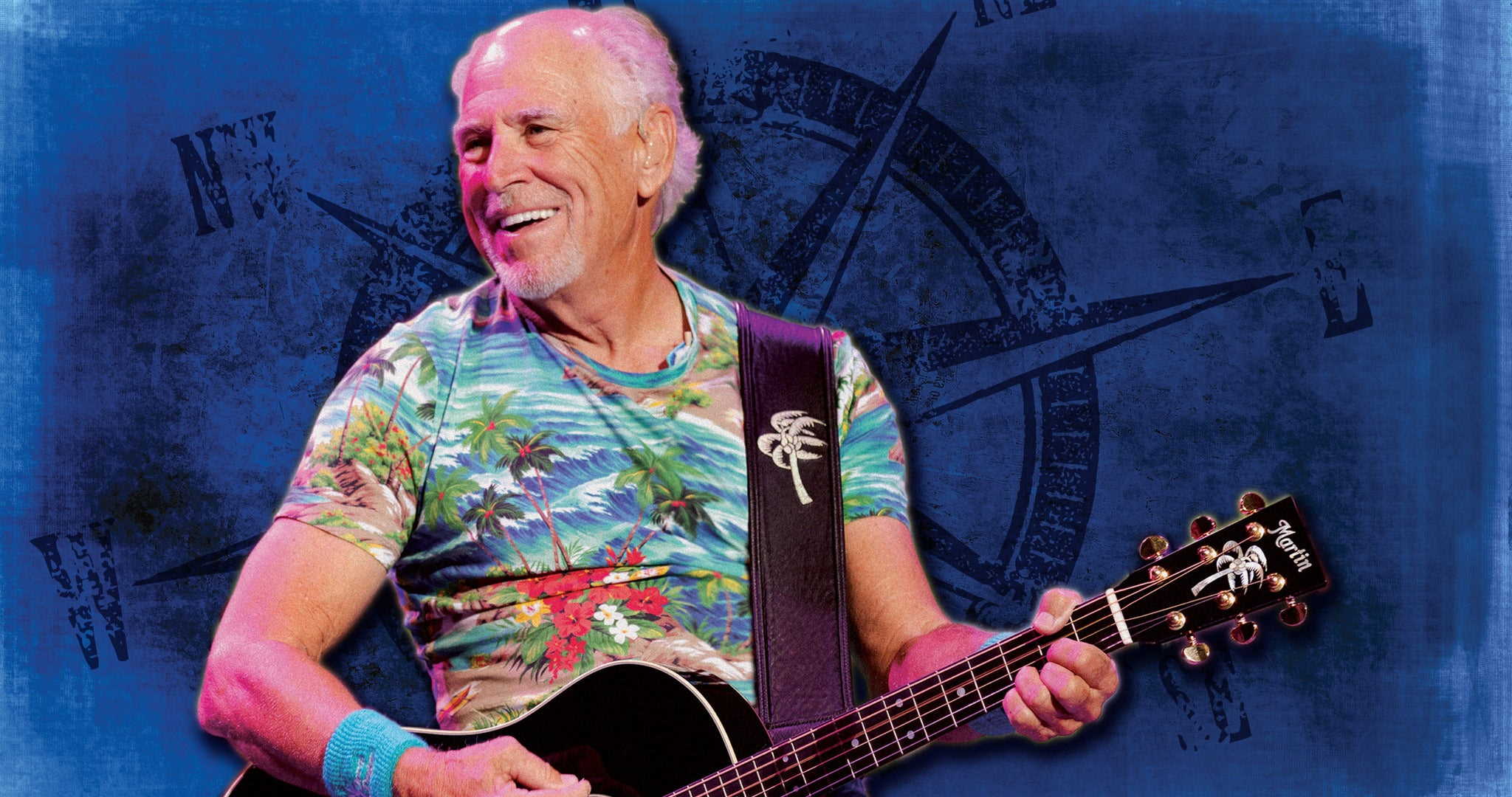
Jimmy Buffett. Photo via Ticketmaster.
Busking in New Orleans
In the May 2011 OffBeat interview “Jimmy Buffett on Bourbon Street” Buffett recalls: “I was going to school in Poplarville [Mississippi] and I got a job at Trader John’s [in the French Quarter], so that had to have been 1967. That was kind of like the minor leagues, and that little club fed other places. The major leagues was the Bayou Room on Bourbon Street. If you weren’t good enough to get into the Bayou, then you went to Trader John’s. But a band had tragically been killed in a car wreck on the Causeway that had worked in the Bayou Room. We went down and auditioned and got the job.
“Tuesday through Sunday, we started at seven in the evening. We played until three in the morning, half hour on, half hour off. And then Mardi Gras, we started at 10 in the morning, and we went until four. I think that’s the hardest job I ever did, doing literally 20 hours of playing. It was amazing. I was 19 years old or something like that.
“In those days, the biggest thing to do was to try not to get as drunk as the audience. Occasionally, we didn’t make the cut, and that wasn’t fun. I learned early on that it was a responsibility to be onstage. I had seen bad drunk performers, and I really didn’t want to be one. I slipped occasionally, but that was a different time. You’d get off work at three and you never got home ’til the sun came up, so you slept all day. And you could get a muffuletta for a dollar and a six pack of Dixie, so it wasn’t a bad life.
“I used to come down before the Trader John’s gig and play on the streets around the Seven Seas and Las Casas de Marinas. I busked probably in the summer of ’66 and got that job in ’67, and in ’68 I was back working on the street. I always had a good time doing it. It’s just what you did. Between gigs, you played on the street. For me, it was fascinating. You were living that kind of romantic life—the reason most people who had any artistic tendencies went to New Orleans. It wasn’t any kind of degrading or down-on-my-luck or broke thing.
“There were definitely songs [that earned tips]. They were all covers. I don’t even know if I’d started songwriting then. Hey, it was the 1960s. A lot of Barry McGuire, “Eve of Destruction.” Folky stuff. Protest songs. I remember there was a song called “The Song of the Salvation Army.” There was one Mason Williams song called “Them Poems.” Certain catchy songs. There were other people playing that had the real jobs and there were groups that I looked up to. I’d pick up material from them and apply the stuff that really worked on crowds and worked it into my set. Humorous drinking songs.
“I’ve always been a shameless entertainer. Chances are, if someone was stopping and listening to you and you made them feel good, then they would put some money into your guitar case.
“And right down the street in those days, Frogman [Henry] was still on the street. And the Nevilles were at the Ivanhoe Piano Bar. There was a lot of music on the street in those days. There was a great piano bar on Iberville, and they had this guy play some Frank Sinatra stuff. And then there was always Las Casas. They had conga drums chained to the wall in the front room, and you could rent the conga drums and play along with the jukebox. I always loved that.
“[In New Orleans] I learned what I was best suited to do. I’m not the best singer or the best guitar player, but I could front a band and run a band. I was the only one in the band who had credit at the music store because I had another job, so I became the leader of the band, and I liked it.”
OffBeat Cover
In OffBeat’s March 1993 issue, Keith Spera interviewed Buffett.
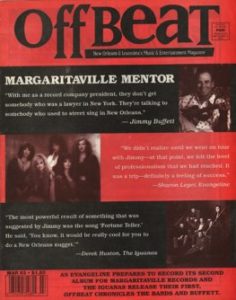
OffBeat cover, March 1993.
Buffett started at the Bayou Room on Bourbon Street at 17, while still a student at Southern Mississippi University. “I went to class in Hattiesburg, but I sort of lived in the French Quarter.
“I was thrown into the spotlight of being the leader of the band ’cause I was the only guy that had credit at Werlein’s to buy the sound system. All I wanted to do was be a background-singing bass player, but then I had no choice. [laughs]
“My personal history goes back to New Orleans when I was a kid, because my grandfather was a captain for the Delta Steamship Company. I remember coming over to meet his ships. When I decided to go out on my own, New Orleans was just, to me, the haven of lunatics from the South, and I fit right into that category.
“But it’s nice to see with my 14-year-old daughter, it’s a place that it was equally magic for me when I was her age as it is for her, and there aren’t many places around that you can say that. One of the great things about New Orleans is that its cultural thread has maintained through generations. That’s what I really love about it.”
Recordings
In the fall of 1971 Buffett was hired by the Nashville club, Exit/In, to open for recording artist Dianne Davidson. Fellow country singer Jerry Jeff Walker took him to Key West, Florida on a busking expedition in November 1971. Buffett moved to Key West and established the beach-bum persona he became known for.
With the untimely death of friend and mentor Jim Croce in a plane crash in September 1973, ABC/Dunhill Records signed and promoted Buffett as a replacement.
Buffett’s second release and his first release on ABC/Dunhill Records was A White Sport Coat and a Pink Crustacean (1973). The album featured the hit singles “Grapefruit—Juicy Fruit” and “Why Don’t We Get Drunk.”
The album Living & Dying in 3/4 Time and A1A both released in 1974, Havana Daydreamin’ in 1976, and Changes in Latitudes, Changes in Attitudes in 1977, featured the hit song “Margaritaville.”
In the summer of 2005, Buffett signed an agreement with Sirius Satellite Radio to broadcast Radio Margaritaville, which, since its founding in 1998, had been broadcast only online.
In August 2006, he released the album Take the Weather with You. The song “Breathe In, Breathe Out, Move On” is in honor of the survivors of 2005’s Hurricane Katrina.
Buffett was set to release his 30th studio album, Equal Strain on All Parts, in late 2023.
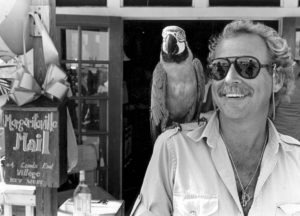
Jimmy Buffett. Photo courtesy of Jimmy Buffett website.
Songwriting
The obituary from Jimmy Buffet’s website indicates the following regarding his several careers: “Although he was best known for upbeat party songs (others include “Cheeseburger in Paradise,” and “Fins”) Buffett first achieved notoriety for thoughtful ballads that showed the influence of Texas songwriters such as Jerry Jeff Walker and Canadian Gordon Lightfoot.
Bob Dylan praised lesser-known Buffett compositions “He Went to Paris” and “Death of an Unpopular Poet”—songs that reflected the observational, storytelling skills Buffett developed in his early career as a journalist for Billboard magazine.
Buffett had a second career as a successful author. He was one of a handful of writers who had number one bestsellers on both the fiction and non-fiction lists of the New York Times Book Review.
He had a third career as an entrepreneur, building a diversified lifestyle brand business, including Margaritaville hotels, restaurants, and retirement communities, along with sidelines such as Land Shark beer. Buffett’s branding and business acumen made him one of the most financially successful musicians of all time.
Pilot
Buffet was an avid pilot. He owned a Dassault Falcon 900 jet that he often used while on concert tours, and during his travels. Throughout his life, he also owned a Boeing Stearman, Cessna Citation, Lake Amphibian and Grumman Albatross.
On August 25, 1994, Buffett crashed his Grumman G-44 Widgeon while attempting to take off in the waters off Nantucket, Massachusetts. The airplane nosed over, and Buffett was able to swim to safety, sustaining only minor injuries.
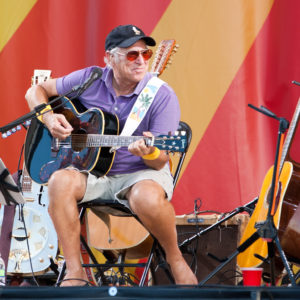
Jimmy Buffett at Jazz Fest. Photo by Brian Bennett.
Support of Louisiana
Buffett supported Louisiana music in numerous ways. His Margaritaville Records released albums by local bands the Iguanas and Evangeline. He often featured southwest Louisiana slide guitarist Sonny Landreth in his Coral Reefer Band. Buffet opened his Margaritaville restaurant and music club on lower Decatur Street.
In OffBeat’s March 1993 issue, Keith Spera spoke with Buffet and his philosophy behind the record label: “The record label is just an extension of that basic philosophy, that we want bands that know how to work. I feel that you can have a career without a hit record. You tell that to a record company executive, and they’ll tell you you’re full of shit. But I think they’re full of shit, because all they’re interested in is their jobs.
“You learn on the streets, and you learn it playin’ in bars, and you learn how to get along with people, and you learn what it takes psychologically to A, start a band, B, keep it together, and C, if you hit, deal with the success. It eats up a lot of people.
“As far as the record business is concerned, the jury’s still out [on Margaritaville Records]. But I still believe that we can do it. I believe fully in the fact that we can develop Evangeline and the Iguanas—they may never have a hit record, but I think that they can sell ample amounts of records, ’cause there’s an audience out there for good performers.
“I think that what we’re trying to do is show that you [should] develop a parallel career. Certainly, you want to make good records, but also, it’s important for a band to have the independence of income so you don’t get dependent on a record label for advances. That’s what eats a lot of people. I know—I’ve been there.
“One thing I told [the Iguanas and Evangeline] is there’s two things you can count on: I won’t steal from you, ’cause I’ve got enough money; and there’s not anything I haven’t seen, and I’m willing to give you that [experience]. That’s basically what I do—I’m sort of like the philosopher/advisor. The people who basically run the record company run it on a full-time basis, and I check in.”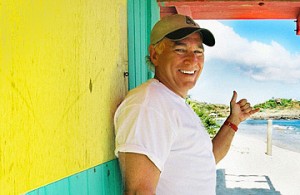
Regarding his often-antagonistic relationship with MCA, his longtime label, and the distributor of Margaritaville records, Buffet said: “I’ve never been on the best of terms with my record label. Right now, we’re in a temporary cease fire.
“My relationship with the California branch has not been good at all, but like I said, I’m in a peace treaty, and I do most of my work out of Nashville. I couldn’t be happier when we marketed the Boats, Beaches, Bars & Ballads boxed set—hell, it’s the eighth-selling boxed set in history, and the biggest-selling MCA boxed set. It’s at about 330,000 boxed sets right now. So, they did an incredible job with the marketing aspect, because I don’t need to worry about airplay, which is a wonderful place to be. I don’t give a shit about gettin’ on the radio. All I need to do is make sure the stuff is in the store.”
Buffet’s post-Katrina performance at Jazz Fest on May 6, 2006, captured Buffett’s emotional connection to New Orleans. “That fit my sense of connection,” he later explained. “And how do you musically get to people about something that devastating, and still not preach to ’em? Some people choose to preach. I choose not to.”
Jazz Fest Poster
The Jazz Fest 2011 poster by New Orleans artist Garland Robinette “Busking Out: Becoming Jimmy Buffett,” depicts Buffett on a street corner playing for tips. A reminder that New Orleans is where Buffett first started to hone his craft.
Family Statement
Buffett is survived by his wife of 46 years, Jane (Slagsvol) Buffett, his daughters Savannah Jane (Joshua) and Sarah Delaney, his son Cameron Marley (Lara), his grandson Marley Ray and devoted pack of dogs—Lola, Kingston, Pepper, Rosie, Ajax and Kody. Also survived by his Montana sister, Laurie Buffett McGuane (Tom), their children Heather Hume, Anne Buffett McGuane, Maggie McGuane and Thomas McGuane IV; his Alabama sister, Lucy Buffett and daughters Mara Delaney Buffett O’Dwyer and Melanie Leigh Buffett; and many more wonderful cousins, nieces and nephews.
In lieu of flowers, the family requests that donations be made to Jimmy Buffett’s Foundation Singing for Change, Brigham and Women’s Hospital, Dana Farber Cancer Institute or MD Anderson Cancer Center.




